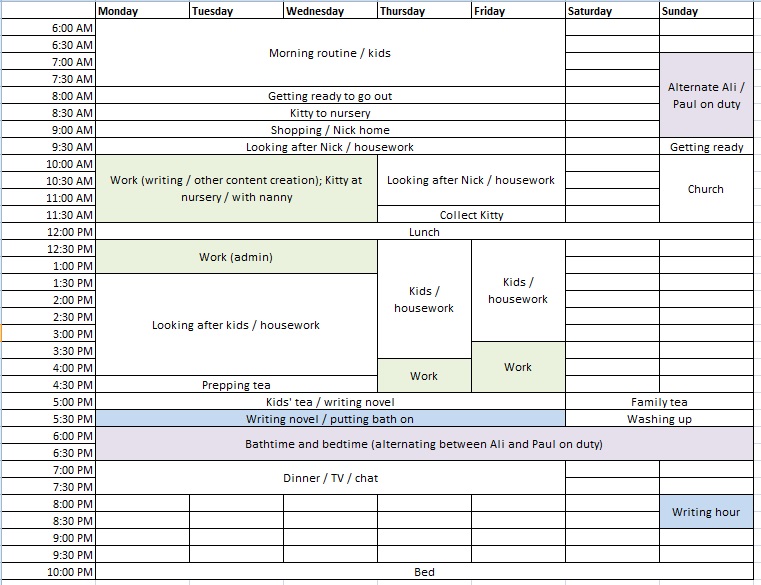How to Plan Writing Time into Your Week [With Downloadable Spreadsheet]

Do you struggle to find time to write?
That’s probably a silly question: almost everyone I talk to does. And many writers (me included) go through months or years of waiting.
Waiting to have a free weekend.
Waiting until the kids are a little older.
Waiting until life isn’t quite so manic.
But a few spare hours won’t magically appear in your schedule. You need to make that time in your week.
Once, I used to be able to write for hours at a stretch, if I wanted.
I could head to a coffee shop for a few hours and draft a whole mini-ebook (that’s how the first version of my free ebook Time to Write came about – you can get that when you join the Aliventures newsletter).
I could write all day long on a Saturday, and come away from my desk in a daze after six hours of novelling.
These days, with two small children, getting hours at a time to write is … not quite an impossible dream, but at least a very rare occurrence!.
Instead, most of my fiction is written in half-hour chunks, between 5.15pm and 5.45pm on weeknights.
That might sound confining and stifling … but actually, the past seven months have been the most productive novel-writing months of my life (and I’ve been writing novels for the past 17+ years).
Having a regular time slot for fiction, instead of just grabbing haphazard chunks of time, has made working on my novel a natural part of my day – and something I really look forward to.
I strongly recommend that you plan writing time into your week – and in this post, I’ll be suggesting some ways to make that work for you.
How Much Writing Time Should You Aim For?
There is no magic formula as to how long you “should” write for every week. (And, while we’re at it – you don’t need to write every day, but it can help with momentum and motivation if you do.)
Obviously, if you’re retired and live alone with no dependents, your week is going to look quite different from someone working part-time with three kids.
As a very rough rule of thumb, I find that about two hours writing each week is enough to keep up momentum on a big project.
If you can fit in a bit more writing than that, 3.5 – 4 hours of solid writing per week is enough to net you a full draft of a novel in 5 months, which is pretty good going for any writer.
Ultimately, any writing at all is better than no writing. You might start off by finding one hour each week to write (which is achievable for almost everyone) and then gradually work up from there.
Would Short or Long Writing Sessions Suit You Best?
You may well have little choice about the length of your writing sessions: perhaps you’d love to write for two hours at a stretch, but there’s no point in your week where you can realistically do so.
If you do have some flexibility on this, experiment with different session lengths to see what works for you.
Also, even if you’re used to writing for long sessions and that’s really not practical … do go ahead with shorter sessions anyway. You will adapt! I used to hate writing in 30 minute bursts, but these days, I’m perfectly happy with it.
Planning Writing Into Your Week
There are a few ways you can approach planning, but for simplicity’s sake, I’m going to present one.
Step #1: Start with a blank week, Monday to Sunday. You might do this in a spreadsheet or on paper.
Step #2: Fill in all your existing commitments: day job, school run, meals, taking care of children, etc … anything that either (a) needs to done at a specific time or (b) prevents you using time for writing (I know some people can write with a toddler hanging on their leg, but I definitely can’t!)
Step #3: Look for prime writing time. Ideally, you want this to be:
- At a time of day when you tend to be feeling energetic and focused. (If that’s not possible, just go for any time that works: you’ll adjust to it.)
- “Bookended” by other commitments. I used to resist this – I wanted to feel that my writing time was open-ended, that I could keep on going if I was on a roll. But actually, I find I focus better and certainly get started much more promptly when I know I’ll need to stop (e.g. to run the kids’ bath).
This is probably obvious, but don’t try to cram writing into every spare minute on your plan. There’ll be lots of other things that you want or need to do during your week – chores, conversations, and having some down time to relax / watch TV / read / etc.
Here’s my spreadsheet, with key commitments filled in and writing time labelled:

You can download my spreadsheet here, in case you want to make it a basis for your own.
You might also want to check out Nicole Avery’s How to Create a Weekly Schedule, particularly if you’re a parent with school-age kids.
(Optional) Step #4: Keep a time log for a week
If your fixed commitments aren’t particularly time-consuming, but you still never seem to have time to write, then try writing down everything you spend your time on for a week.
This is a pain to do … but often very illuminating.
(If you want a quick way to get more of an idea where all your time goes, and you spend a lot of your day at a computer, install RescueTime to track which programs you’re using most. The basic version is free.)
Make Sure You Commit to Your Writing Time
Make a clear commitment, ideally in writing, and ideally to someone other than yourself (feel free to use the comments section of this post, or tweet to me @aliventures).
I’m going to write from 5.15pm to 5.45pm on weeknights.
If you live with housemates, a partner, kids, etc, then let them know about your writing time. “I’m going to be writing from 8pm to 9pm on Sundays,” or whatever it might be.
You may want to ask them to help you stay committed, and in some cases, you might need to nudge them into finding their own activities that emphatically do not involve talking to you! (If you do find that family members interrupt a lot, try wearing headphones, or working in a different room – perhaps the shed, if you have one.)
It might take a few weeks for you and everyone else to adjust to your writing schedule. Keep at it, even if you have some wobbles at first.
If you’ve tried to write regularly in the past but never really managed it, your family may need a bit of time to realise that you’re serious about it now – and you may need to prove to yourself that you’re taking your writing seriously.
And Now … Do It!
I know you’re busy. You have a lot going on. But you can find an hour to write this week. (It doesn’t have to be all at once: 20 minutes on three evenings counts.)
If your main job involves writing – e.g. you’re a freelance writer – then don’t weasel out of this one. Instead, you can find an hour for something that you really WANT to write, like a short story or a blog post.
Here’s your challenge: When will you fit in your hour of writing this week? Drop a comment below to tell me, and I’ll email you next week to ask how you got on – if you haven’t already popped back to tell us. J (If you’d rather not comment publicly, just drop me an email – ali@aliventures.com.)
About

I’m Ali Luke, and I live in Leeds in the UK with my husband and two children.
Aliventures is where I help you master the art, craft and business of writing.
Start Here
If you're new, welcome! These posts are good ones to start with:
Can You Call Yourself a “Writer” if You’re Not Currently Writing?
The Three Stages of Editing (and Nine Handy Do-it-Yourself Tips)
My Novels

My contemporary fantasy trilogy is available from Amazon. The books follow on from one another, so read Lycopolis first.
You can buy them all from Amazon, or read them FREE in Kindle Unlimited.
8 Comments
Trackbacks/Pingbacks
- Monday Must-Reads [08.15.16] - […] How to Plan Writing Time into Your Week [With Downloadable Spreadsheet] – Aliventures […]


Thanks for this super helpful post!!
I’m scheduling my writing in from 1-2:30pm every week day. Taking advantage of some extra free time I have right now 🙂
Thank you!
Good luck, Kate! That sounds like a great, specific time slot to use for writing. Hope it goes brilliantly for you. 🙂
Hi, Ali,
I love your posts. They are very informative.
Today’s is particularly applicable for me since I have a 3-year- old. I am sending her to after-school daycare for 4 hours. I spent half the time each, for blog and book. I am writing one chapter per week (including multiple revisions) and am finally out of my block. It feels so good to get the wheels running, finally.
I must also mention, that I started my blog after stumbling upon yours while browsing randomly, on a particularly frustrating day. So big thanks to you, though belated.
Waiting for more.
Ani.
Thanks so much for the lovely comment, Ani — so glad you’re enjoying my blog. Dividing your time between blog and book sounds very sensible, and it’s great that you’ve got past that block. I find that once I get going with a project, it’s easier to keep on — but the getting started (or, often, re-started) can be very tough.
That is some good advice. If writer’s block not kicking my ass sometimes, I can write almost daily, no problem. I usually write in the late night or early morning, anywhere between 10 pm to 3 am. I don’t know why, but those are usually the hours where my mind is running wild with imagination and ideas.
I can barely string a sentence together by 10pm — I’m definitely a morning person! But I’ve heard lots of writers say they like to work late at night (or, like you, on into the early morning). Some people suggest that, just before bedtime or just after waking up, we’re still close to the “dream state” of sleeping — so perhaps it’s natural that we tend to be most creative at those times.
Thank you, Ali; always happy to read your latest posts. How ironic, you and I were pondering on the same subject at about the same time. I recently started a blog and intend to post weekly, Sundays, with snippets about my writing life. Two weeks ago, I responded to a question I hear often, “How do I find time to write?” Afterwards, I got your email and appreciated reading how you address the same sort of thing. So, when I posted yesterday, I brought closure to the prior week’s post by mentioning you and your idea. I included a link to your site. I hope that’s okay.
Kindly, -Elle Mott-
Thanks Elle! I super-appreciate the link, thank you. 😀 And I love your approach of “embracing” time to write.